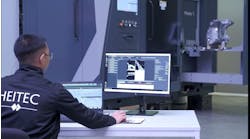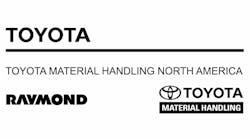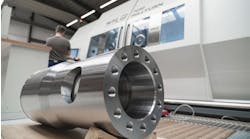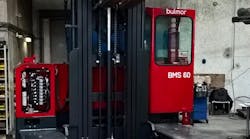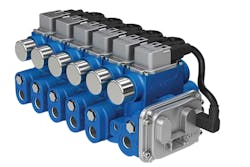Bulmor Industries, GmbH based in Perg, near Linz, Austria, is a specialist in material handling solutions, particularly for long, heavy, or large items. Founded in 1879, the company is well-known for designing and manufacturing machines to specific customer requirements. Bulmor began building forklift trucks in the 1960s and later began specializing in sideloaders. Today, Bulmor is one of the strongest brands in the sector, offering custom-made four-way sideloaders with lifting capacities from 2 to 10 tonnes, sideloaders with lifting capacities from 4 to 20 tonnes, and electric sideloaders with lifting capacities from 3 to 8 tonnes.
Steering Control Challenge
For its latest four-way sideloader, which offers customized height and width to help maximize storage capacity, Bulmor sought an electrohydraulic mobile valve capable of overcoming a number of challenges. Specifically, the steering control of the individual drive wheels is of paramount importance, as Bulmor’s Thomas Goesweiner explains: “Our four- way sideloader offers a fast and programmable multidirectional steering system, where precise control of the four independently steered drive wheels under various load conditions is imperative. Ultimately, steering comfort, precision, and driver assistance are our leading requirements.”
In addition to safe and smooth load control, the four-way sideloader features a mast shift function that can sometimes suffer from an overrunning condition where load inertia takes over control. Along with this challenge, Bulmor also required a high-efficiency valve solution able to reduce energy consumption.
Performance and Flexibility
The answer arrived in the form of an Eaton seven-bank variable-inlet CMA090 valve, which is digitally configured with Eaton’s Pro-FX Configure software plus a DPS2-12 differential pressure valve. Chosen for its product performance and flexibility, the advanced CMA mobile valve with independent metering offers a sophisticated technology platform that streamlines and simplifies everything from design and set-up to operation and optimization.
Eaton’s CMA valves, shown here can handle an overrunning load by applying meter-out control to hold constant pressure on the upstream port.
“All four wheels must follow a given steering algorithm without any delay or variance, regardless of load conditions,” states Goesweiner. “Here, the CMA valve’s flow control is providing the best steering performance we’ve ever achieved. This is due to a number of factors, not least 0.125 lpm resolution, fast electronic pressure and temperature compensation, and electronically calibrated sections to compensate for machining tolerances.”
The CMA’s integral flow share feature with priority selection for the steering system also eliminates the need for a remote priority valve. In cases where the supply flow is less than that required by the sideloader, this feature ensures the steering system is always supplied on demand. System architecture is further simplified as the single spool operation for the single-acting cylinder reduces the number of valve banks; two banks are effectively combined into one. Reduced inventory is another advantage as the programmable CMA reduces the number of valve variations, adding to the value proposition.
No More Overrunning
Eaton’s CMA valve also addressed the challenge of overrunning conditions, whereby the direction of the desired velocity is in the same direction as external forces that can cause loss of load control and unsafe operation—typically during downhill operation or vehicle braking. Although most applications use a variety of conventional valves to create the opposing hydraulic force, the CMA system applies a load differential calculation to determine if the direction of load is the same or opposite direction as the desired velocity.
Through port pressures and the areas on each side of the actuator, CMA valves can assign the load differential to be either a passive or overrunning load. For the latter, the control applies a meter-out strategy and will hold constant pressure on the upstream port.
With regard to efficiency, the CMA system continuously monitors the flow balance at the inlet port of the valve set, along with the pressure and temperature of the oil. The valve then controls and modulates the pressure governed by the DPS2 regulator valve with varying logic, thereby reducing the flow margin applied to the sideloader’s variable-speed
pump. In addition, as the power loss of a priority valve has been eliminated by the integral flow-share feature, CMA valves effectively reduce any wasted energy. The reduction of power losses allows a longer operating time or more load cycles with a battery charge; the side loader rarely has to go to the charging station. Furthermore, the lower power requirement reduces the thermal load on the electric drive of the hydraulic pump.
This leads to lower operating temperatures of the electrical components. Interruption due to high temperatures can be avoided, hence higher efficiency and productivity. Furthermore, during field testing Bulmor measured energy consumption across the machine. It found that the new solution for the current draw of the steering system dropped significantly—from 300 A to 150. Bulmor calculated 30 to 40% more efficiency; in essence, the less power loss the longer the machine can remain operational between charges.
Rapid Parameter Optimization
Featuring on-board electronics and sophisticated software algorithms, CMA valves provide flexible configuration, immediate communication, and precise control. Using Eaton’s Pro-FX technology platform, common application functions can be enabled right on the valve, reducing development time. With electronic tuning, performance parameters can be tested and optimized in seconds, not months—a genuine industry differentiator. The CMA valve is the only one of its kind where it is possible to set system parameters from a laptop, vehicle app, or other input device. What’s more, advanced control algorithms mean these valves automatically optimize for conditions such as oscillation and vibration, improving control and reducing risk.
Summing Up the Benefits
Eaton delivered a seven bank variable inlet CMA090 valve, digitally configured with Eaton’s Pro FX software. This solution delivers fast electronic and temperature compensation combined with 0.125 lpm resolution. Bulmor has defined the solution as the best steering performance that their four-way sideloader forklifts have ever achieved due to the precise control delivered by the valve bank. Furthermore, the CMA solution offers advanced energy efficiency, increasing operating times and reducing thermal load on the hydraulic pump.
This information was provided by Jiri Foukner, product manager, at Eaton’s Hydraulics Group, Eden Prairie, Minn. For more information call (952) 937-9800, or visit www.eaton.com/hydraulics.



